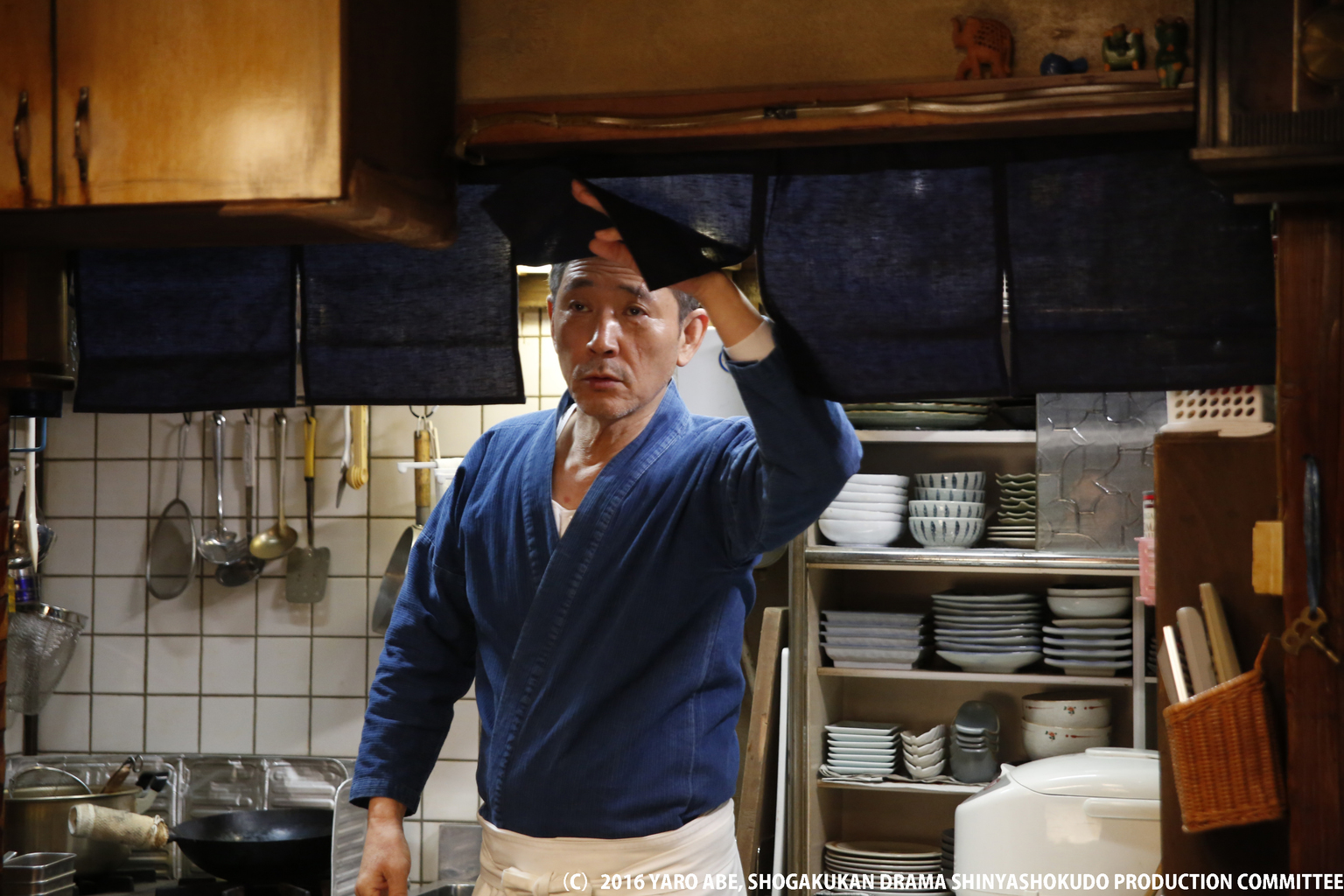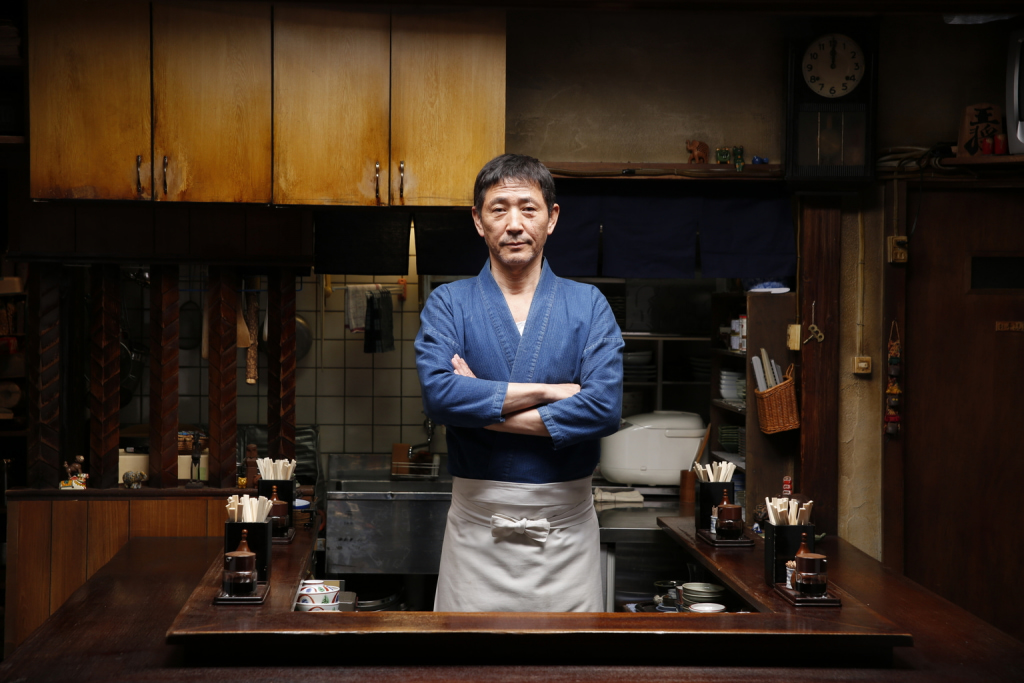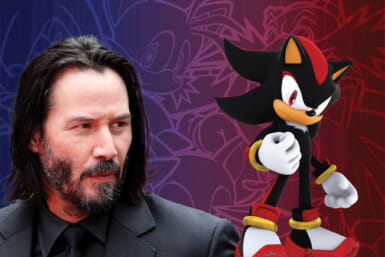Centered around a small Shinjuku eatery that’s open from midnight to 7am, the MBS and Netflix show Midnight Diner is a compilation of many different human stories. Some are touching, others are heartbreaking and there are those that are funny. All of them include beautiful stories of everyday human problems that we can all relate to. And tying it all together is the proprietor of the diner: A scarred man known only as “the Master.” He is the one unchanging, constant part of this anthology series. The role is played by Kaoru Kobayashi. Like his character, the Kyoto-born actor is a true master of his craft.
The Human Mirror
The Master from Midnight Diner might seem like a one-note character whose role is just to serve as the show’s framing device, but there is a lot of subtle and brilliant acting going on there underneath the surface. Basically, he seems to be channeling the energy of every individual customer he deals with. Though usually understated, when serving a tough but ultimately decent yakuza, for instance, the Master is laconic and direct. At the same time, he’s never rude or confrontational, much like the customer. Conversely, in the presence of, let’s say, an aspiring singer, he’s smiling. He talks a bit more and is generally more outgoing.

Photo courtesy of (C)2016 Yaro Abe, Shogakukan/ Drama Shinyashokudo Production Committee
As a result, we see a slightly different Master in each episode. Every little touch Kobayashi puts into those performances gives us little glimpses into the true nature of his customers. He becomes a kind of human mirror which takes a lot of talent and experience. Kobayashi has been seemingly preparing for this his entire career.
Some roles seem almost tailor-made for Kobayashi. The 2019 film His Lost Name is a perfect example of this. He plays a woodworker who takes in a young man he finds passed out on a riverbank. Without spoiling the story, he acts in a very subtle way. He never smiles with his eyes and talks as if he were just reading a line (in a good way). You instantly get the feeling that his character is hiding something and you get a similar vibe with the younger man. As the movie progresses, we see they have quite a lot in common. Their relationship is mysterious and Kobayashi’s delicate yet powerful performance adds to the intrigue.

From His Lost Name. Photo courtesy of Magic Hour Inc. (C)
Stealing the Show in a Smaller Role
Kobayashi is able to do this even when he’s not the main character. In the 2013 film The Great Passage, he plays a mild-mannered editor forced to leave his job early in the story. He entrusts the task of working on a new dictionary to the timid and solemn Majime (Ryuhei Matsuda). Interestingly, though, when it is just the two of them on screen, Kobayashi’s character instantly changes gears. He speaks with a degree of passion about the importance and power of words. It’s as if he’s trying to bring out the same in Majime, who he feels is a kindred spirit. It’s this uncanny ability to instantly forge connections between himself and his co-stars that makes Kobayashi’s acting so unforgettable.
Nowhere is this truer than in 2017’s The Miracles of the Namiya General Store in which Kobayashi only had a minor role. When we see him talking to his son, who’s saying that he’ll give up on music to help run the family business, it’s like Kobayashi is channeling the son’s thoughts and feelings. He tells him to not give up on his dreams but with noticeable fear and trepidation. It’s clear from the script that this was supposed to be one of those typical uplifting scenes where the seemingly stern father gives the child his unexpected blessing. Kobayashi, though, takes it a step further. He puts another layer on things by having his character empathize with his son. You can see his hesitation about their own future. It’s a finely tuned and very persuasive performance.
A Man of Many Talents
Perhaps Kobayashi’s most challenging role to date came in the 1999 movie Himitsu in which he played a man who loses his wife in an accident but then seemingly gets her back when it appears that her soul has moved to the body of their daughter. As shock gives way to happiness but ultimately sadness and confusion, Kobayashi isn’t really doing his human mirror thing here, but rather inadvertently practicing for it. Himitsu forces the actor to go through a gamut of emotions in one film. The role earned him a nomination for the Best Lead Actor Award at the 23rd Japan Academy Prize. We also see this type of multilayered acting in his first major movie, 18-sai, Umi e for which he won the Hochi Film Award for Best New Artist in 1979.
It seems that throughout his 40 years of acting, Kaoru Kobayashi has managed to find the secret to bringing out his A game, but he thankfully never overuses it. He isn’t some one-trick pony who only relies on one interesting acting gimmick to get by. He only ever employs this technique to enhance a movie. When it’s not necessary, he can just be pleasant and easy-going (like in The Island of Cats) or stoic (in Natsumi’s Firefly), so whenever you see him, you never know what you’re going to get. But you can be sure that it’s going to be amazing.
Film fans might want to check out the following articles:









